牛津译林版(2019)必修 第一册Unit 2 Let's talk teens Reading课件(共38张)
文档属性
| 名称 | 牛津译林版(2019)必修 第一册Unit 2 Let's talk teens Reading课件(共38张) | 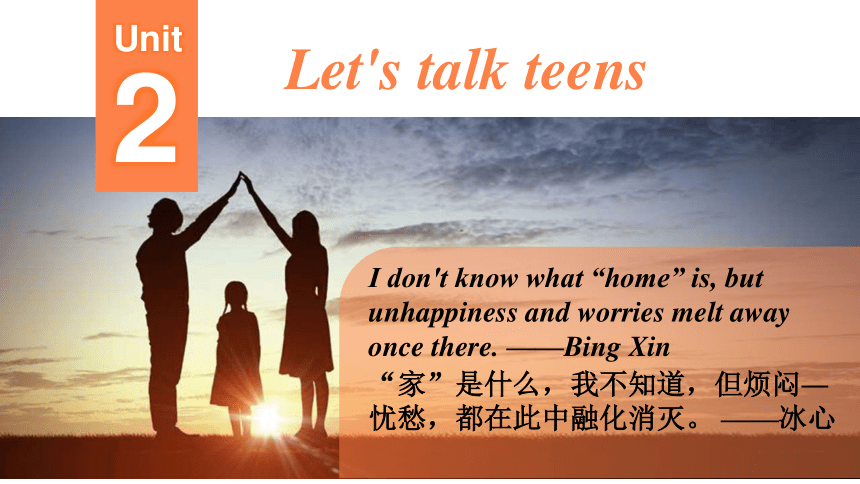 | |
| 格式 | pptx | ||
| 文件大小 | 8.4MB | ||
| 资源类型 | 教案 | ||
| 版本资源 | 牛津译林版(2019) | ||
| 科目 | 英语 | ||
| 更新时间 | 2024-11-01 14:41:44 | ||
图片预览

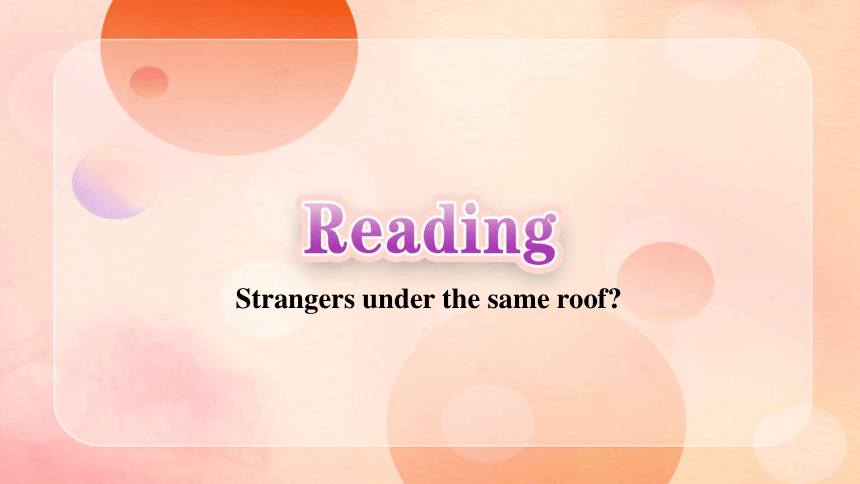
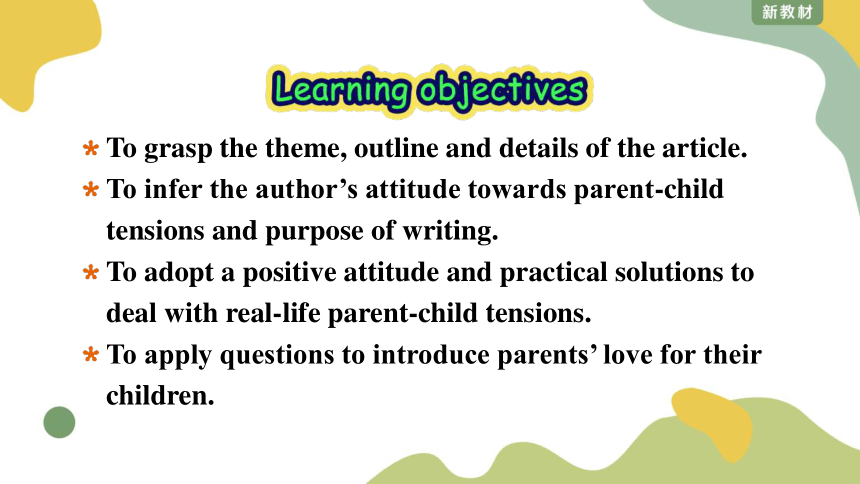

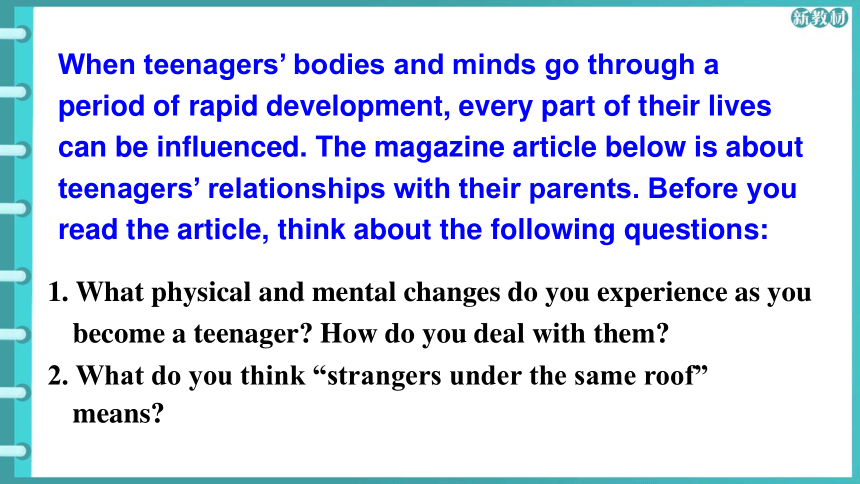
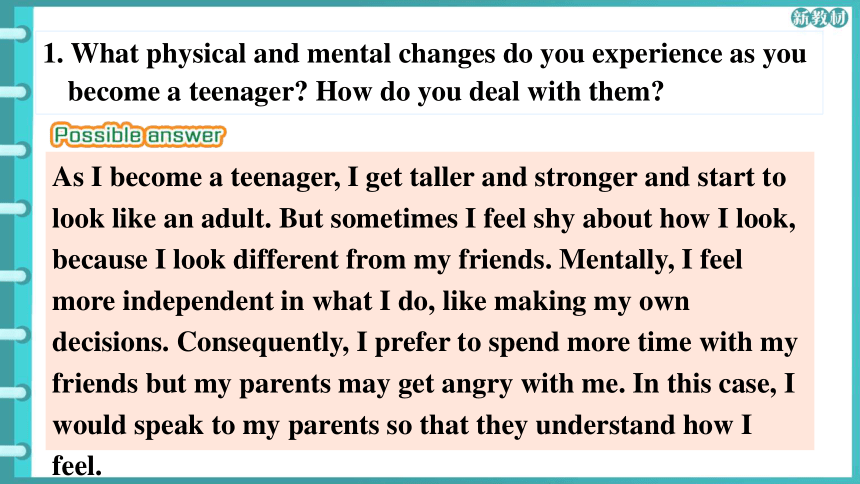
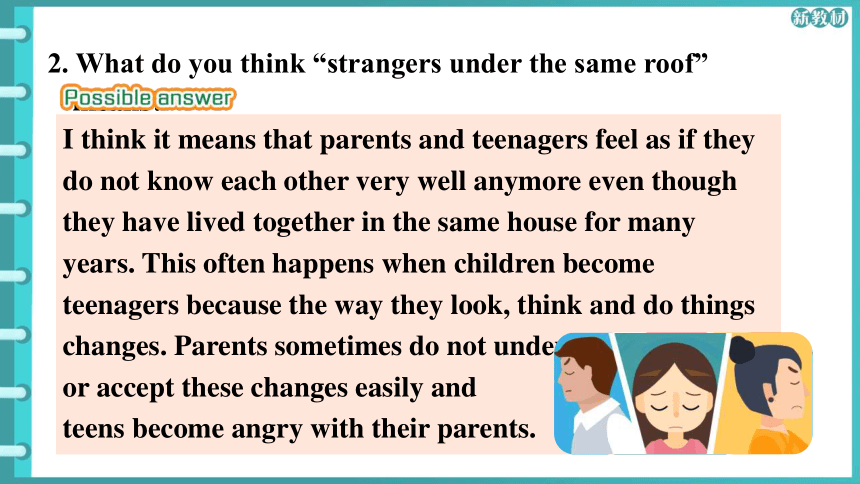
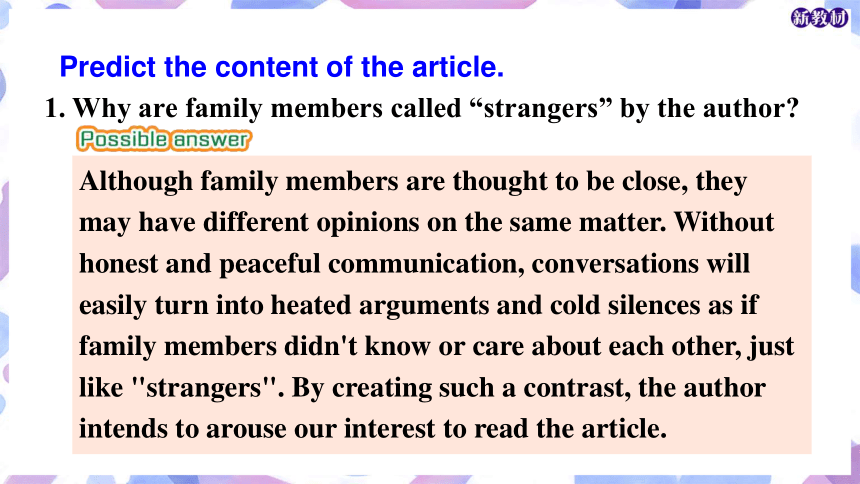
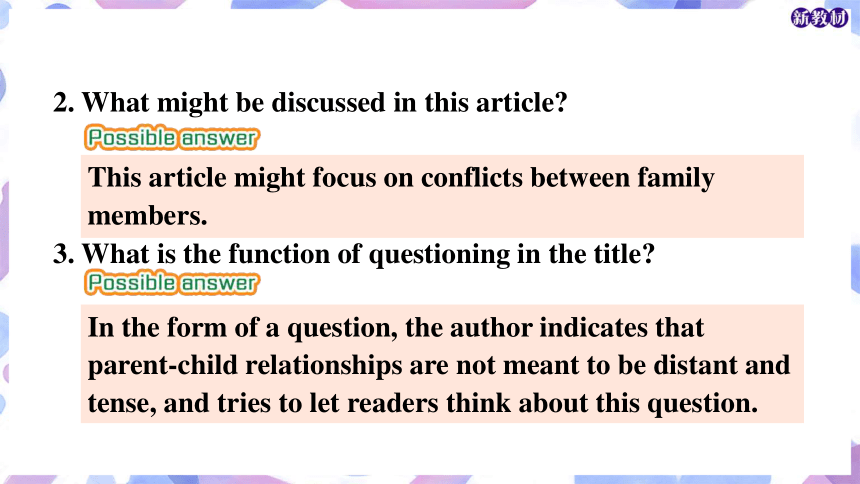
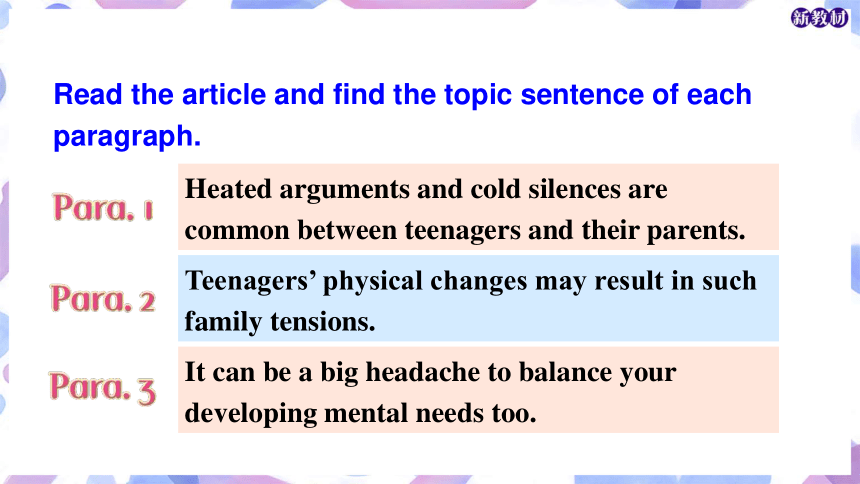
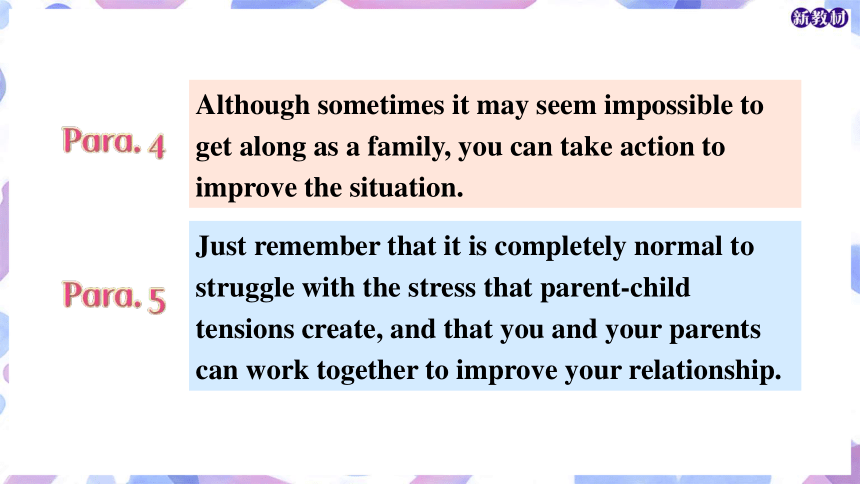
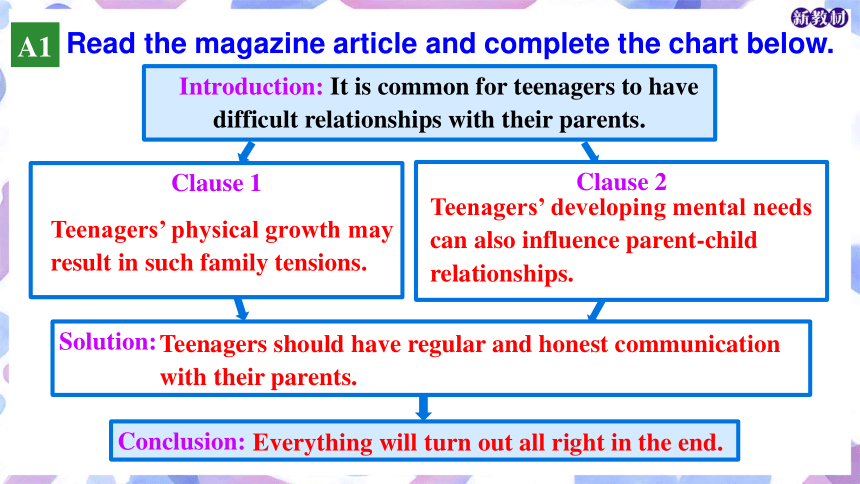
文档简介
(共38张PPT)
Let's talk teens
Unit
2
I don't know what “home” is, but unhappiness and worries melt away once there. ——Bing Xin
“家”是什么,我不知道,但烦闷―忧愁,都在此中融化消灭。 ——冰心
Strangers under the same roof
To grasp the theme, outline and details of the article.
To infer the author’s attitude towards parent-child tensions and purpose of writing.
To adopt a positive attitude and practical solutions to deal with real-life parent-child tensions.
To apply questions to introduce parents’ love for their children.
1. What is happening in the family
Tense relationship.
2. Look at the title and predict what the passage is about.
When teenagers’ bodies and minds go through a period of rapid development, every part of their lives can be influenced. The magazine article below is about teenagers’ relationships with their parents. Before you read the article, think about the following questions:
1. What physical and mental changes do you experience as you become a teenager How do you deal with them
2. What do you think “strangers under the same roof” means
1. What physical and mental changes do you experience as you become a teenager How do you deal with them
As I become a teenager, I get taller and stronger and start to look like an adult. But sometimes I feel shy about how I look, because I look different from my friends. Mentally, I feel more independent in what I do, like making my own decisions. Consequently, I prefer to spend more time with my friends but my parents may get angry with me. In this case, I would speak to my parents so that they understand how I feel.
2. What do you think “strangers under the same roof” means
I think it means that parents and teenagers feel as if they do not know each other very well anymore even though they have lived together in the same house for many years. This often happens when children become teenagers because the way they look, think and do things changes. Parents sometimes do not understand
or accept these changes easily and
teens become angry with their parents.
1. Why are family members called “strangers” by the author
Although family members are thought to be close, they may have different opinions on the same matter. Without honest and peaceful communication, conversations will easily turn into heated arguments and cold silences as if family members didn't know or care about each other, just like "strangers". By creating such a contrast, the author intends to arouse our interest to read the article.
Predict the content of the article.
2. What might be discussed in this article
3. What is the function of questioning in the title
This article might focus on conflicts between family members.
In the form of a question, the author indicates that parent-child relationships are not meant to be distant and tense, and tries to let readers think about this question.
Read the article and find the topic sentence of each paragraph.
Heated arguments and cold silences are common between teenagers and their parents.
Teenagers’ physical changes may result in such family tensions.
It can be a big headache to balance your developing mental needs too.
Although sometimes it may seem impossible to get along as a family, you can take action to improve the situation.
Just remember that it is completely normal to struggle with the stress that parent-child tensions create, and that you and your parents can work together to improve your relationship.
Read the magazine article and complete the chart below.
Introduction: It is common for teenagers to have difficult relationships with their parents.
Clause 1
Clause 2
Teenagers’ physical growth may result in such family tensions.
Teenagers’ developing mental needs can also influence parent-child relationships.
Solution:
Conclusion:
Teenagers should have regular and honest communication with their parents.
Everything will turn out all right in the end.
A1
Introduction: It is common for teenagers to have difficult relationships with their parents.
Clause 1
Clause 2
Teenagers’ physical growth may result in such family tensions.
Teenagers’ developing mental needs can also influence parent-child relationships.
Solution:
Conclusion:
Teenagers should have regular and honest communication with their parents.
Everything will turn out all right in the end.
Presenting
a problem
Analyzing
a problem
Solving
a problem
Conclusion
1. What physical changes might teenagers worry about
Their changing voices, weight problems or spots.
The state of being no longer a small child but not quite an adult.
Read the magazine article again carefully and answer the following questions.
2. What does “middle ground” in line 15 mean
A2
3. What does “that” in “that makes you feel unhappy” in line 19 refer to
4. How can teenagers have a healthy discussion with their parents
When teenagers disagree with their parents, they should take a minute to clam down and try to understand the situation from their parents’ point of view. After they have thought it through, they should explain their actions and feelings calmly, listen carefully and address their parents’ concerns.
Teenagers feel ready to be more responsible and make decisions on their own, but their parents do not always agree.
1. Why does the author use “in the other hand” in line 20 on page 17
2. What are the two kinds of uneasy mental needs that teenagers have
By saying this, the author means that teenagers have two kinds of uneasy mental needs.
They have a new desire for independence and a continued need for their parents’ love and support.
Further analyse the details of the article by answering the following questions.
Situations Teenagers feel ready to (1) __________________________________________________. However, parents do not (2) _________________________. Teenagers who are (3) ____________________________________________________ wish their parents could be more caring and patient.
But parents expect (4) ______________________.
Mental needs Teenagers have a new desire for independence. Teenagers have a continued need for their parents’ love and support.
Complete the following table according to Paragraph. 3 and 4.
be more responsible and make decisions on their own
always agree
struggling to control their feelings
them to act like adults
Solutions Teenagers: calm down; think through the situation from (5) _________ point of view; explain themselves calmly; listen carefully and (6) __________________________. learn when to (7) _________. learn when to ask parents to (8) __________________.
parents’
address parents’ concerns
back down
relax their control
1. What is the author's attitude to parent-child tensions Use information in the magazine article to support your idea.
The author believes parent-child tensions are natural and unavoidable. He argues that the two causes of these tensions are the physical and mental changes that teenagers go through. Although the changes can be stressful, the author thinks that teenagers and their parents can get along better by communicating with each other. He believes that everything will be fine in the end.
Answer the following questions.
2. For what purpose does the author write this article
He wants to help teenagers realize that parent-child tensions are normal and inform them of possible causes and solutions so as to have teenagers mentally prepared to go through adolescence as smoothly as possible.
3. What is the tone of the article Why does the author write in such a way to address parent-child tensions
The tone of this article is casual and easy. In this way it is easier for the author to convince us not to panic when facing parents-child tensions, which will turn out all right eventually.
The magazine article uses a group of questions to introduce the topic of parent-child tensions. Read the first paragraph of the magazine article and introduce the topic of parents’ love for their children by asking questions.
When a group of questions are used to introduce a topic, they are usually not meant to be answered. Rather, the author intends to draw readers’ attention to the topic and make them think about and take an interest in it.
Learn this
B3
Do your parents always let you know they are proud of you
Do they always stand by you no matter what decisions you make
Do they love you the way you are
Can we start the article with a group of declarative sentences instead of questions Which way is better and why
We can do so but in believe it is better to start the article with questions. Not only are we attracted to the article by the questions, but we are also more willing to pay attention to the arguments put forward by the author.
Answer the following questions.
Mrs Zhao wrote an email to a teen plete the email with the correct forms of the words and phrases in the box below.
anxious argument concern calm down
normal stress struggle go through
Dear Editor,
I am writing to ask for advice on my relationship with my teenage son. To tell the truth, I often (1)____________ to get along with him.
struggle
B1
Recently we have argued with each other a great deal. He is (2)___________ about his skin because it has started to become very oily, with lots of red spots. He is always angry these days and seems less confident. I keep telling him that these changes are (3)__________, and that things will turn out just fine. Of course, I wanted to show my (4)___________ for his condition, so I asked him to see a doctor.
anxious argument concern calm down
normal stress struggle go through
anxious
normal
concern
But then he became angry and we had a big (5)___________. He told me that I was putting even more (6)___________ on him by talking about his spots all the time. In the end, I sent him to his room. He finally (7)_____________, but it took some time. The whole experience was really terrible and I do not want to (8)___________ the same thing again. What should I do
Best wishes
Mrs Zhao
anxious argument concern calm down
normal stress struggle go through
argument
stress
calmed down
go through
If you were the editor, how would you reply to the mum
Dear Mrs Zhao,
Thank you for your letter. I can fully put myself into your shoes, as my teen used to have the same problem — too concerned about his looks. At first, I stepped in by advising him, but it simply added fuel to the flames. Later I took him to the public library and encouraged him to read books on teenage health.
He learnt that it is normal for teenagers’ skin to grow oilier and then he calmed down. I told him that as long as he is independent and confident, he will feel good. And today, he is happy confident teenager. So why not take a step back and allow him to think for a while about his situation I am sure he will welcome your guidance and support.
Best wishes,
XXX
Forming abstract nouns
Abstract nouns refer to ideas or qualities. They cannot be physically touched, for example, ability, silence and tension. We can form abstract nouns using certain suffixes. Sometimes the final letter(s) of a word should be left out or changed when we add a suffix, e.g. silent-silence, decide→ decision.
Parts of speech Suffixes Words
Adjectives -ce independence
-ty/-ity honesty
Nouns -hood adulthood
-ship relationship
Verbs -ment
argument
-tion/-sion communication
-th growth
importance
reality ability safety difficulty
childhood
membership leadership friendship
movement agreement management development enjoyment
conclusion
warmth
The article uses some abstract nouns. Note the following suffixes and think of more abstract nouns formed with them. Then fill in the table below with as many words as you can.
B2
1. The magazine article suggests that teenagers want both independence and their parents’ love and support. Do you feel the same way or not Give an example.
I feel the same way. Sometimes I wish my parents would treat me like an adult and give me the freedom to make my own decisions. However, when I experience difficulties or setbacks, I would also like their encouragement and comforting words. This makes me feel loved and gives me the courage to keep going.
Answer question 2 and 3 of A3 on page 18.
2. What stresses do the parents of a teenager have to deal with How do they influence the parent-child relationship
Parents may worry about their children’s performance at school. If children fail to get good grades, their parents might start to be stricter, believing they are not doing their best. This in turn makes their children upset. Parents may also worry that their children are not making the “right” friends. As a result, they might ask a lot of questions about their children’s friends, such as where they are going and what they are doing together. This can make their children feel like they are not trusted.
Have you ever had a conflict with your parents First fill the following table and then write a 150-word episode of one conflict with your parents. Try to add a unique title and begin the story with a questions to stir readers’ interest.
One conflict with my (1) _________ When did it happen (2)_____________________________________
Where did it happen (3)_____________________________________
What happened (4) ____________________________________
____________________________________
Why did it happen (5)_____________________________________
_____________________________________
_____________________________________
How was it solved (6)_____________________________________
_____________________________________
_____________________________________
mum
One night
At home
Mum and I had a big quarrel and I ran away from home.
Mum compared me to Leo again, a next door’s straight- A student, which made me sad.
After I cooled myself down, I returned home and talked it out sincerely with my parents. Things are OK now.
Nature or nurture
What if “the kid next door” is excellent, and I am not I keep wondering this every time my mum compares me to other super kids. So, one night when mum mentioned Leo again, the straight- A student who lives next door, I yelled, “So be it! I wish I hadn’t been born!” and ran away from home. It was cold and I soon regretted doing that but refused to admit it.
When I finally tried to sneak back, my parents and I cried together. We then sat down and had a long talk that I would never forget. Mum apologized to me and realized that maybe she treated me the way her mum treated her.
I felt guilty about not understanding my parents and grateful for their love. We decided to be more honest with each other from then on.
Let's talk teens
Unit
2
I don't know what “home” is, but unhappiness and worries melt away once there. ——Bing Xin
“家”是什么,我不知道,但烦闷―忧愁,都在此中融化消灭。 ——冰心
Strangers under the same roof
To grasp the theme, outline and details of the article.
To infer the author’s attitude towards parent-child tensions and purpose of writing.
To adopt a positive attitude and practical solutions to deal with real-life parent-child tensions.
To apply questions to introduce parents’ love for their children.
1. What is happening in the family
Tense relationship.
2. Look at the title and predict what the passage is about.
When teenagers’ bodies and minds go through a period of rapid development, every part of their lives can be influenced. The magazine article below is about teenagers’ relationships with their parents. Before you read the article, think about the following questions:
1. What physical and mental changes do you experience as you become a teenager How do you deal with them
2. What do you think “strangers under the same roof” means
1. What physical and mental changes do you experience as you become a teenager How do you deal with them
As I become a teenager, I get taller and stronger and start to look like an adult. But sometimes I feel shy about how I look, because I look different from my friends. Mentally, I feel more independent in what I do, like making my own decisions. Consequently, I prefer to spend more time with my friends but my parents may get angry with me. In this case, I would speak to my parents so that they understand how I feel.
2. What do you think “strangers under the same roof” means
I think it means that parents and teenagers feel as if they do not know each other very well anymore even though they have lived together in the same house for many years. This often happens when children become teenagers because the way they look, think and do things changes. Parents sometimes do not understand
or accept these changes easily and
teens become angry with their parents.
1. Why are family members called “strangers” by the author
Although family members are thought to be close, they may have different opinions on the same matter. Without honest and peaceful communication, conversations will easily turn into heated arguments and cold silences as if family members didn't know or care about each other, just like "strangers". By creating such a contrast, the author intends to arouse our interest to read the article.
Predict the content of the article.
2. What might be discussed in this article
3. What is the function of questioning in the title
This article might focus on conflicts between family members.
In the form of a question, the author indicates that parent-child relationships are not meant to be distant and tense, and tries to let readers think about this question.
Read the article and find the topic sentence of each paragraph.
Heated arguments and cold silences are common between teenagers and their parents.
Teenagers’ physical changes may result in such family tensions.
It can be a big headache to balance your developing mental needs too.
Although sometimes it may seem impossible to get along as a family, you can take action to improve the situation.
Just remember that it is completely normal to struggle with the stress that parent-child tensions create, and that you and your parents can work together to improve your relationship.
Read the magazine article and complete the chart below.
Introduction: It is common for teenagers to have difficult relationships with their parents.
Clause 1
Clause 2
Teenagers’ physical growth may result in such family tensions.
Teenagers’ developing mental needs can also influence parent-child relationships.
Solution:
Conclusion:
Teenagers should have regular and honest communication with their parents.
Everything will turn out all right in the end.
A1
Introduction: It is common for teenagers to have difficult relationships with their parents.
Clause 1
Clause 2
Teenagers’ physical growth may result in such family tensions.
Teenagers’ developing mental needs can also influence parent-child relationships.
Solution:
Conclusion:
Teenagers should have regular and honest communication with their parents.
Everything will turn out all right in the end.
Presenting
a problem
Analyzing
a problem
Solving
a problem
Conclusion
1. What physical changes might teenagers worry about
Their changing voices, weight problems or spots.
The state of being no longer a small child but not quite an adult.
Read the magazine article again carefully and answer the following questions.
2. What does “middle ground” in line 15 mean
A2
3. What does “that” in “that makes you feel unhappy” in line 19 refer to
4. How can teenagers have a healthy discussion with their parents
When teenagers disagree with their parents, they should take a minute to clam down and try to understand the situation from their parents’ point of view. After they have thought it through, they should explain their actions and feelings calmly, listen carefully and address their parents’ concerns.
Teenagers feel ready to be more responsible and make decisions on their own, but their parents do not always agree.
1. Why does the author use “in the other hand” in line 20 on page 17
2. What are the two kinds of uneasy mental needs that teenagers have
By saying this, the author means that teenagers have two kinds of uneasy mental needs.
They have a new desire for independence and a continued need for their parents’ love and support.
Further analyse the details of the article by answering the following questions.
Situations Teenagers feel ready to (1) __________________________________________________. However, parents do not (2) _________________________. Teenagers who are (3) ____________________________________________________ wish their parents could be more caring and patient.
But parents expect (4) ______________________.
Mental needs Teenagers have a new desire for independence. Teenagers have a continued need for their parents’ love and support.
Complete the following table according to Paragraph. 3 and 4.
be more responsible and make decisions on their own
always agree
struggling to control their feelings
them to act like adults
Solutions Teenagers: calm down; think through the situation from (5) _________ point of view; explain themselves calmly; listen carefully and (6) __________________________. learn when to (7) _________. learn when to ask parents to (8) __________________.
parents’
address parents’ concerns
back down
relax their control
1. What is the author's attitude to parent-child tensions Use information in the magazine article to support your idea.
The author believes parent-child tensions are natural and unavoidable. He argues that the two causes of these tensions are the physical and mental changes that teenagers go through. Although the changes can be stressful, the author thinks that teenagers and their parents can get along better by communicating with each other. He believes that everything will be fine in the end.
Answer the following questions.
2. For what purpose does the author write this article
He wants to help teenagers realize that parent-child tensions are normal and inform them of possible causes and solutions so as to have teenagers mentally prepared to go through adolescence as smoothly as possible.
3. What is the tone of the article Why does the author write in such a way to address parent-child tensions
The tone of this article is casual and easy. In this way it is easier for the author to convince us not to panic when facing parents-child tensions, which will turn out all right eventually.
The magazine article uses a group of questions to introduce the topic of parent-child tensions. Read the first paragraph of the magazine article and introduce the topic of parents’ love for their children by asking questions.
When a group of questions are used to introduce a topic, they are usually not meant to be answered. Rather, the author intends to draw readers’ attention to the topic and make them think about and take an interest in it.
Learn this
B3
Do your parents always let you know they are proud of you
Do they always stand by you no matter what decisions you make
Do they love you the way you are
Can we start the article with a group of declarative sentences instead of questions Which way is better and why
We can do so but in believe it is better to start the article with questions. Not only are we attracted to the article by the questions, but we are also more willing to pay attention to the arguments put forward by the author.
Answer the following questions.
Mrs Zhao wrote an email to a teen plete the email with the correct forms of the words and phrases in the box below.
anxious argument concern calm down
normal stress struggle go through
Dear Editor,
I am writing to ask for advice on my relationship with my teenage son. To tell the truth, I often (1)____________ to get along with him.
struggle
B1
Recently we have argued with each other a great deal. He is (2)___________ about his skin because it has started to become very oily, with lots of red spots. He is always angry these days and seems less confident. I keep telling him that these changes are (3)__________, and that things will turn out just fine. Of course, I wanted to show my (4)___________ for his condition, so I asked him to see a doctor.
anxious argument concern calm down
normal stress struggle go through
anxious
normal
concern
But then he became angry and we had a big (5)___________. He told me that I was putting even more (6)___________ on him by talking about his spots all the time. In the end, I sent him to his room. He finally (7)_____________, but it took some time. The whole experience was really terrible and I do not want to (8)___________ the same thing again. What should I do
Best wishes
Mrs Zhao
anxious argument concern calm down
normal stress struggle go through
argument
stress
calmed down
go through
If you were the editor, how would you reply to the mum
Dear Mrs Zhao,
Thank you for your letter. I can fully put myself into your shoes, as my teen used to have the same problem — too concerned about his looks. At first, I stepped in by advising him, but it simply added fuel to the flames. Later I took him to the public library and encouraged him to read books on teenage health.
He learnt that it is normal for teenagers’ skin to grow oilier and then he calmed down. I told him that as long as he is independent and confident, he will feel good. And today, he is happy confident teenager. So why not take a step back and allow him to think for a while about his situation I am sure he will welcome your guidance and support.
Best wishes,
XXX
Forming abstract nouns
Abstract nouns refer to ideas or qualities. They cannot be physically touched, for example, ability, silence and tension. We can form abstract nouns using certain suffixes. Sometimes the final letter(s) of a word should be left out or changed when we add a suffix, e.g. silent-silence, decide→ decision.
Parts of speech Suffixes Words
Adjectives -ce independence
-ty/-ity honesty
Nouns -hood adulthood
-ship relationship
Verbs -ment
argument
-tion/-sion communication
-th growth
importance
reality ability safety difficulty
childhood
membership leadership friendship
movement agreement management development enjoyment
conclusion
warmth
The article uses some abstract nouns. Note the following suffixes and think of more abstract nouns formed with them. Then fill in the table below with as many words as you can.
B2
1. The magazine article suggests that teenagers want both independence and their parents’ love and support. Do you feel the same way or not Give an example.
I feel the same way. Sometimes I wish my parents would treat me like an adult and give me the freedom to make my own decisions. However, when I experience difficulties or setbacks, I would also like their encouragement and comforting words. This makes me feel loved and gives me the courage to keep going.
Answer question 2 and 3 of A3 on page 18.
2. What stresses do the parents of a teenager have to deal with How do they influence the parent-child relationship
Parents may worry about their children’s performance at school. If children fail to get good grades, their parents might start to be stricter, believing they are not doing their best. This in turn makes their children upset. Parents may also worry that their children are not making the “right” friends. As a result, they might ask a lot of questions about their children’s friends, such as where they are going and what they are doing together. This can make their children feel like they are not trusted.
Have you ever had a conflict with your parents First fill the following table and then write a 150-word episode of one conflict with your parents. Try to add a unique title and begin the story with a questions to stir readers’ interest.
One conflict with my (1) _________ When did it happen (2)_____________________________________
Where did it happen (3)_____________________________________
What happened (4) ____________________________________
____________________________________
Why did it happen (5)_____________________________________
_____________________________________
_____________________________________
How was it solved (6)_____________________________________
_____________________________________
_____________________________________
mum
One night
At home
Mum and I had a big quarrel and I ran away from home.
Mum compared me to Leo again, a next door’s straight- A student, which made me sad.
After I cooled myself down, I returned home and talked it out sincerely with my parents. Things are OK now.
Nature or nurture
What if “the kid next door” is excellent, and I am not I keep wondering this every time my mum compares me to other super kids. So, one night when mum mentioned Leo again, the straight- A student who lives next door, I yelled, “So be it! I wish I hadn’t been born!” and ran away from home. It was cold and I soon regretted doing that but refused to admit it.
When I finally tried to sneak back, my parents and I cried together. We then sat down and had a long talk that I would never forget. Mum apologized to me and realized that maybe she treated me the way her mum treated her.
I felt guilty about not understanding my parents and grateful for their love. We decided to be more honest with each other from then on.
